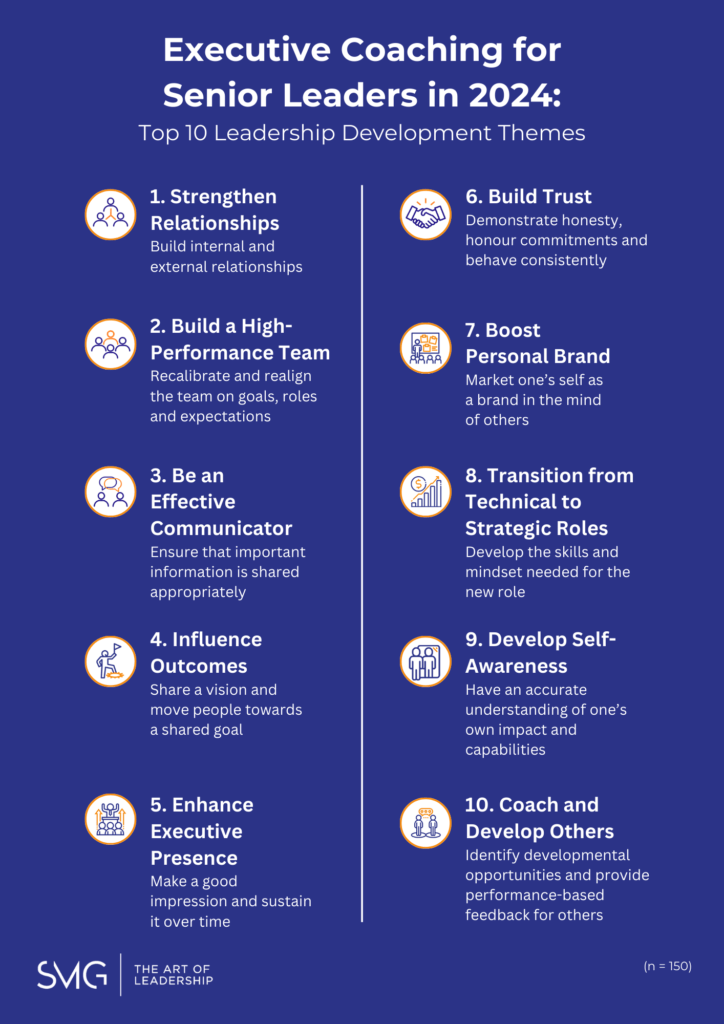The ability to build internal and external relationships has emerged as the number one focus area in a snapshot of 150 senior leader executive coaching assignments in the region. Based on our customer research data and trends, our team share the top 10 coaching themes for 2024 and what they mean for organisations.

Why building stronger relationships is a priority
Understanding why building stronger relationships is a priority for senior leaders requires stepping back from the data and looking at the context in which these leaders are operating.
The key to successful leadership comes down to three core attributes:
1. Adaptability: being able to pivot and embrace changing circumstances – such as the impact of AI and technology – and remain on track to deliver your strategic priorities.
2. Flexibility: being able to effectively adapt and evolve requires a flexible non-linear thinking style that allows for innovation and new ideas to generate new pathways and ways of thinking.
3. The integration of IQ with EQ: bringing together one’s logical cognitive processing capacity with one’s self-awareness and social skills. This allows a leader to navigate complex situations in a constructive and sustainable manner that motivates and aligns the team and broader organisation.
Managing change, unlocking the value of diverse thinking, and motivating and aligning an organisation requires strong and trusting relationships with all key stakeholders.
Coaching and mentoring these senior leaders provides them with an external perspective and trusted advice on how to apply their existing relational skills to new, emerging and, typically, complex challenges.
This advanced level of coaching and mentoring requires an understanding of the business context and human behaviour.
It also requires a deep understanding of organisational systems, because at the heart of all organisations are system – systems of people. The only way that an organisational system can operate effectively is if all the subsystems – that is, teams – operate cohesively in service of the organisation’s purpose and aligned with its values. When they don’t, leadership becomes about managing dysfunction, rather than elevating performance.
The fundamental foundation of all systems of people is relationships. The strength of relationships is measured by the depth of trust; and work environments where relationships are built on trust are typically characterised by:
- A free-flowing exchange of ideas—people say what they need to say
- A healthy tension that promotes constructive conflict and feedback
- An encouragement and environment that promotes a diversity of views
- An environment in which people feel comfortable to challenge the status quo and are applauded for doing do, as opposed to being judged or criticised.
The new normal is changing the way we lead
We are living in an increasingly fast-paced and changing world:
- Technological advancements in ways of working;
- Demographic changes and employee expectations;
- Globalisation and the increasing complexity of organisational structures, and;
- Social requirements about organisational responsibilities.
This dynamic and increasingly complex environment requires leaders to embrace new norms for leadership, and transform and adapt to situations faster and with ease. They need to exhibit flexibility, adaptability, resilience, and innovation while navigating each situation. Constantly looking for new ways of thinking, getting things done, and then learning from failure when the situation requires yet another new approach, needs an environment of psychological safety. To create psychological safety, team members not only need to feel comfortable speaking up, but feel that their contributions are valued and they are encouraged to share them without negative repercussions. This requires deep and trusting relationships.
Strengthening relationships is about the basics of human connection
Strengthening relationships ultimately comes down to the basics of human connection:
- Spending time to really know and understand the other person and their perspectives.
- Listening with a curious mindset, free of judgement.
- Holding conflicting perspectives as an object to examine and learn from, not as a challenge to one’s own position.
- Bringing one’s voice to the conversation as an ‘alternative’ perspective, not an ‘opposing’ one.
Building mutual trust between individuals requires a genuine interest to know and understand the other.
This enables us to contextualise their views, integrate it with our own, and come up with something bigger and better – all while building a deeper human connection.
How executive coaching supports senior leaders to build capability in the areas that matter
The old saying “slowing down to speed up” is applicable to leadership. Despite the fast pace change environment in which leaders operate today, taking the time to invest in building relationships is key to unlocking engagement, performance and sustainability.
Creating the space for reflection and being challenged to reflect upon how you as a leader invest your time can provide an opportunity to step outside of the immediate priorities and focus on what is important. Building one’s ability to slow down, be curious, really listen, and getting to know others, is one of the most impactful investments a leader can make.
Then when you need to step up, or there is a crisis, you can have confidence in those around you – because they want to be there to help you and the business.









